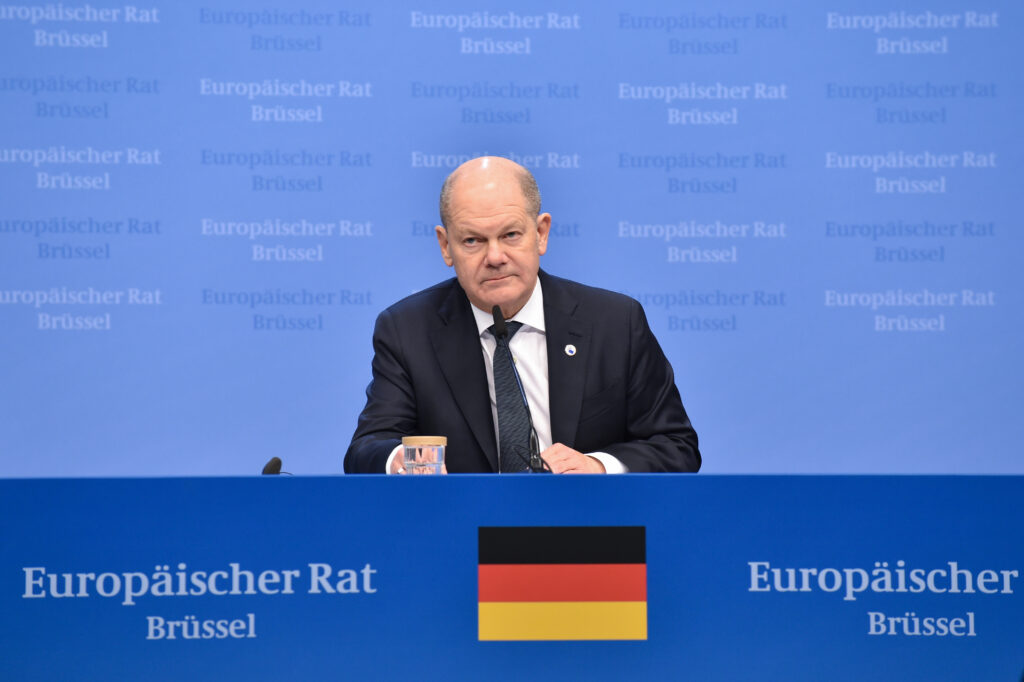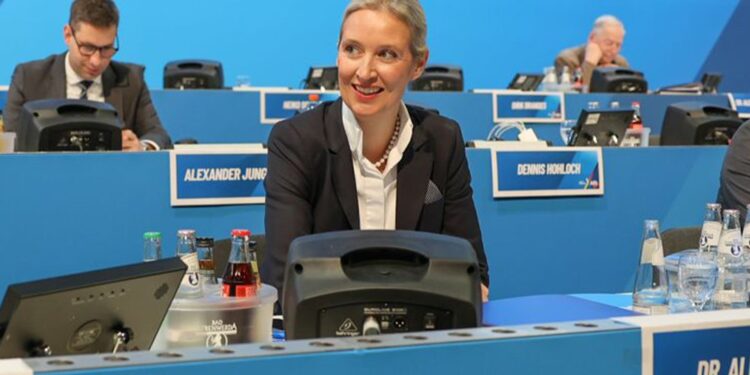Brussels – In the new year, the election campaign has officially begun in Germany, where citizens will go to the polls on February 23 to renew the Bundestag and the government. The ultra-right AfD, for the first time in its history, has nominated a candidate for chancellor, party co-president Alice Weidel. The post-Nazi formation aims to cross the psychological threshold of 20 percent and is virtually guaranteed (barring unforeseen events) to overtake the Social Democrats of outgoing Chancellor Olaf Scholz.
At the 16th federal congress of Alternative für Deutschland (AfD) held over the weekend (Jan. 11-12), the ultranationalist and Euroskeptic party unanimously chose Alice Weidel, co-president with Tino Chrupalla since June 2022, as the candidate for chancellor.
“Thank you very much for your great trust,” she said from the stage in Riesa, Saxony (one of the party’s strongholds in former East Germany, where it achieved overwhelming success in September’s elections). “I’m looking forward to out joint election campaign,” she added, “for Germany, our country, and our future!“
Thank you very much for your great trust. I am very much looking forward to our joint Alternative for Germany election campaign for our country, for our future! Thank you so much for your trust. I am excited to lead our campaign as the chancellor candidate for the Alternative… pic.twitter.com/J3QvxRxnIa
— Alice Weidel (@Alice_Weidel) January 11, 2025
It is the first time AfD has expressed a candidate for chancellor since its foundation in 2013. For several months, all available polls have shown the ethno-nationalist, pro-Kremlin, and anti-migrant formation coming in second in the early elections that the government crisis triggered in November.
While the top spot will unquestionably go to the conservatives of the Christian Democratic Union (CDU/CSU) led by Friedrich Merz, which surveys give at around 31 percent of support, AfD is steadily hovering around 20 percent, with the most generous projections predicting as high as 22 percent. For the leadership, AfD’s goal will be to break through the psychological threshold of 20 percent. At the last federal elections in 2021, it had taken 10.4 percent, sending to the Bundestag 83 deputies (11 fewer than in 2017).
The Social Democratic Party (SPD), which confirmed on Jan. 11 the outgoing chancellor Olaf Scholz as its candidate (a mere formality after the step aside by the only potential challenger, Defense Minister Boris Pistorius), plays for third place against the Greens, current coalition partners, dueling for a result between 16 and 14 percent. For the Socialists, this could be the worst defeat in over 160 years, a decidedly unworthy defeat from the far-from-brilliant interlude between the reign of Angela Merkel (16 years in power between 2005 and 2021) and the following Christian Democratic chancellorship of Merz.

The political fact worthy of note is the growth in popularity of Germany’s far-right in recent years, although the positive trend is not uniform throughout the Federal Republic: the AfD is traditionally stronger in the eastern Länder, those that made up the DDR in the days of the Cold War, while support for its candidates is much more tepid in the wealthier, industrialized areas of the country.
Moreover, in Germany, the cordon sanitaire seems to be holding against those whom a majority of the population continue to oppose as post-Nazis, and together with whom the traditional parties (including the CDU/CSU) so far have refused to govern at both a local and national level. Therefore, beyond all the talk, there is no chance for the AfD to win the chancellorship (an impossible feat, numbers in hand) nor to enter the control room as a partner in a coalition executive.
Nevertheless, Elon Musk, the wealthiest man on the planet who will have a key role in the next US administration led by Donald Trump, recently praised Weidel and her background. During a live broadcast on the X platform, which he owns along with Tesla and SpaceX, the South African-born tycoon explicitly said that “only the AfD can save Germany,” sparking an uproar in both Berlin and Brussels.
However, despite the electoral success predicted in polls within the AfD, not everyone seems to be rowing in the same direction. There are allegedly internal divisions within the party, with the most fundamentalist base blaming the leadership for moderating its tone on various issues such as abortion, climate change, and compulsory military conscription, for example. At the Riesa congress, there was a heated debate over the reform (later approved by delegates) of the party’s youth organization, Junge Alternative (JA), which German authorities certified as “extremist” last June and which has a long history of disagreements with the leadership.
English version by the Translation Service of Withub







